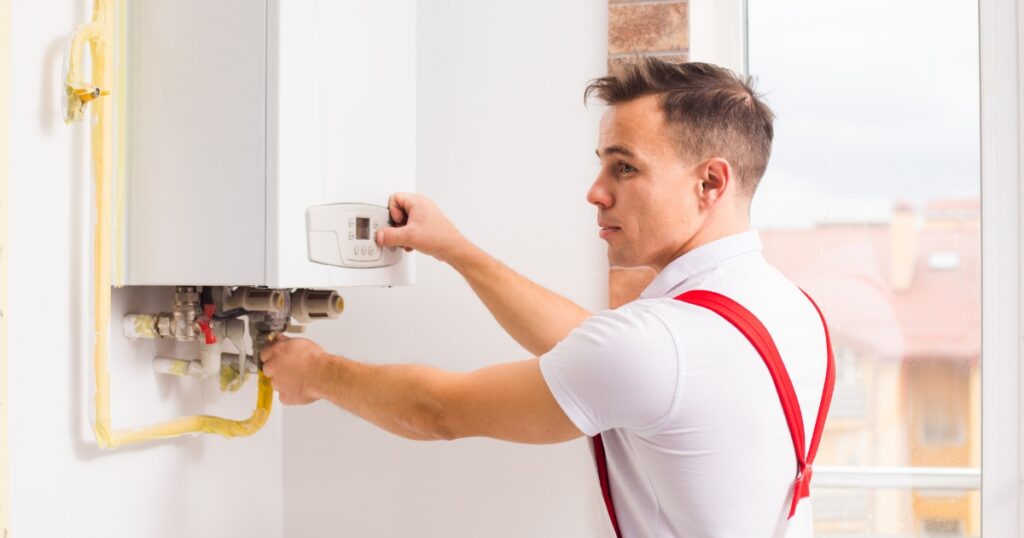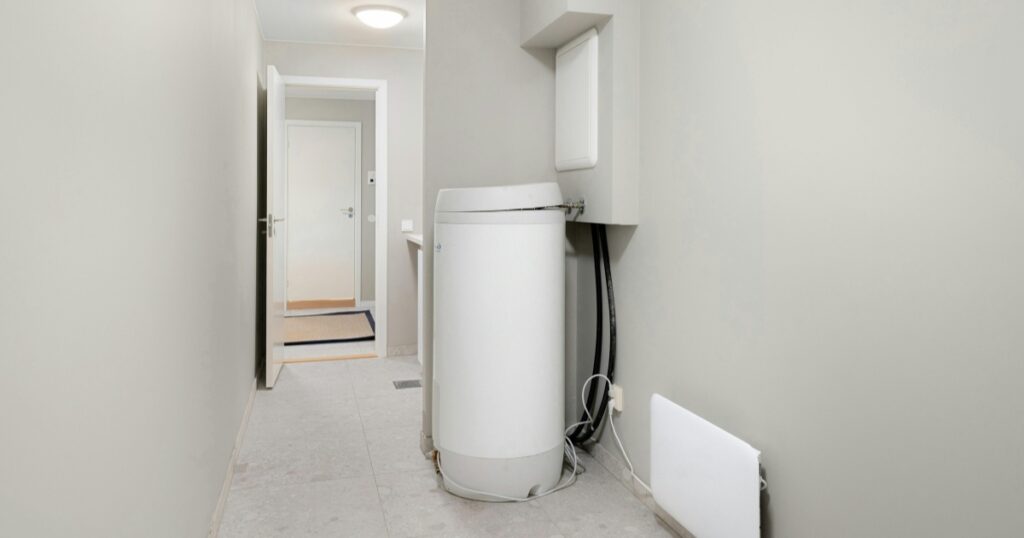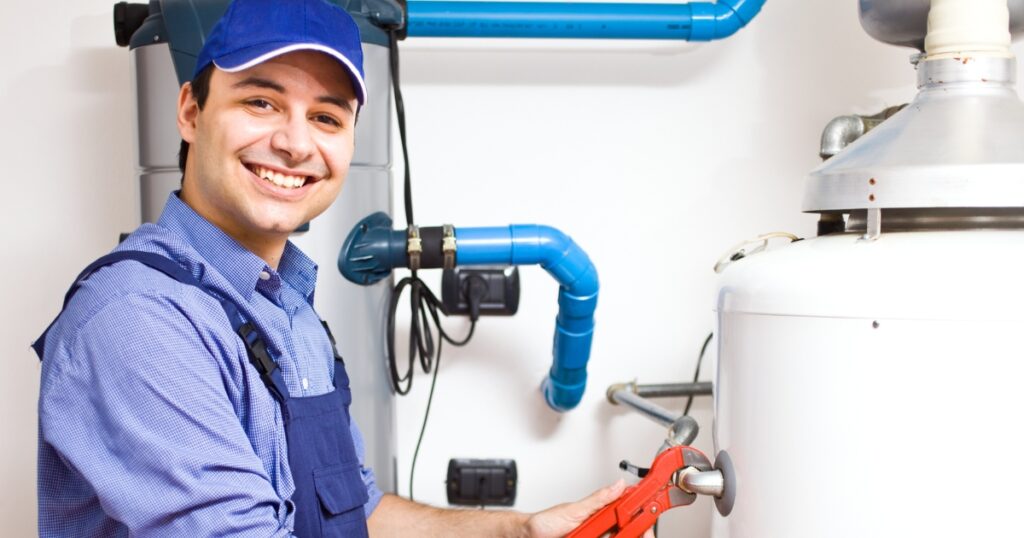Struggling with dodgy hot water heater problems and fed up with lukewarm or downright chilly showers? You’re not alone, mate! A fair few of us have been in the same boat. After doing heaps of research and gaining first-hand experience in dealing with these issues, it’s clear – this is more common than you’d imagine, trust us.
Who knew that the bulk of service calls to plumbers were all about hot water system dramas? But don’t stress; we’ve got your back. This blog is going to be your ultimate guide for cracking down on those pesky electric and gas hot water heater glitches, offering handy tips on how to sort them out yourself.
Key Takeaways
- If you have no hot water, check for issues with your heating components or gas supply.
- Inadequate hot water may be due to a faulty heating element, sediment buildup, or a malfunctioning thermostat.
- Excessively hot water can be caused by a faulty thermostat or temperature control valve.
- Water leaks should be addressed promptly to prevent further damage and costly repairs.
- Rust-coloured water or bad odour may indicate corrosion in the tank that can be resolved through maintenance and flushing.
- Noisy tanks could signal sediment buildup or a faulty expansion valve that requires professional attention.
- Gas water heater problems may include issues with the pilot light, insufficient heat production, or gas leaks.

Troubleshooting Electric Water Heater Problems
If your electric water heater is not providing hot water, there are several potential issues to troubleshoot.
No hot water
Dealing with no hot water in the house can be frustrating. It’s often a problem with your electric or gas water heater. The main cause could be an issue with your heating components such as a faulty heating element that’s struggled to produce enough heat, which is quite common in electric heaters.
On the other hand, for gas heaters, it might relate to issues in the gas supply or pilot light malfunctions. Before jumping to conclusions, make sure you’ve checked all possibilities including pressing reset buttons on electric heaters and ensuring there is an adequate supply of gas for those using gas heaters.
Inadequate hot water
If you’re experiencing inadequate hot water in your home, there could be several possible causes. One common issue is a faulty or damaged heating element in your electric water heater.
This can result in the water not getting heated up properly, leading to lukewarm or cold showers. Another potential cause could be a build-up of sediment or mineral deposits in the tank, which reduces the efficiency of the heating process.
Additionally, an incorrectly set thermostat or a malfunctioning thermostat can also result in inadequate hot water output. To resolve these issues, you may need to replace the heating element, flush out any sediment from the tank, or adjust/replace the thermostat as necessary.
The water temperature is too hot
If you find that the water temperature from your hot water heater is excessively hot, it could be a sign of a problem. This issue can be caused by a faulty thermostat or a malfunctioning temperature control valve.
It’s important to address this problem promptly as scalding water can cause burns and other injuries. To fix this, you may need to adjust or replace the thermostat or temperature control valve on your water heater.
Remember to always prioritise safety when working with hot water systems and consult a professional if you are unsure how to proceed.
Water leaks
Water leaks are a common problem with water heaters that can lead to significant damage if not addressed promptly. If you notice any signs of water leakage, such as puddles or wet spots around your water heater, it is important to take action.
Turn off the power supply and the water source to prevent further damage. Inspect the fittings and connections for any loose or damaged parts and tighten or replace them if necessary.
If the leak persists, it may be due to a faulty valve or pressure relief device, in which case it’s best to contact a professional plumber for assistance. Remember, addressing water leaks early can help prevent costly repairs in the future.
Rust-coloured water or bad odour
If you notice rust-coloured water or a foul odour coming from your hot water, it could be a sign of corrosion in the tank or the anode rod. This can happen over time as minerals and sediment build up inside the heater.
To fix this issue, you may need to replace the anode rod or flush out the tank to get rid of any accumulated debris. Regular maintenance and flushing can help prevent these problems in the future and keep your hot water clean and odour-free.
Tank making noises
If you hear your hot water tank making strange noises, it could be a sign of an underlying issue. Banging or popping sounds often indicate sediment buildup in the tank. The sediment can cause the heating element to overheat, leading to loud noises.
Flushing the tank regularly can help prevent this problem. Another possible cause of noisy tanks is a faulty expansion valve. This valve helps regulate pressure in the system and excessive noise may indicate a malfunction.
If you notice unusual sounds coming from your hot water tank, it’s best to have it checked by a professional plumber to diagnose and fix the problem promptly.
Troubleshooting Gas Water Heater Repair
If you’re experiencing no hot water from your gas water heater, check the pilot light to ensure it’s ignited and adjust the thermostat if necessary.
No hot water
If you’re experiencing the frustration of no hot water in your home, there could be several reasons behind this issue. One common cause could be a malfunctioning heating element in your electric water heater, which can prevent it from producing any heat.

Another possibility is a tripped reset button that needs to be checked and reset if necessary. Gas water heaters may have issues with the pilot light or gas supply that can result in no hot water.
It’s important to troubleshoot these problems to identify the specific issue and take appropriate action for the restoration of hot water in your home.
Inadequate hot water
If your hot water is not getting as hot as it should, there may be a few reasons behind the inadequate temperature. One common issue is a faulty heating element in electric water heaters, which can result in reduced heat production.
Another possibility is sediment buildup inside the tank, reducing its efficiency. Additionally, an insufficiently sized water heater for your household’s needs may also lead to inadequate hot water supply.
It’s important to have these issues addressed to ensure you have enough hot water for everyday use.
The water temperature is too hot
If you find that the water temperature from your hot water heater is too hot, it could be a sign of an underlying problem. One possible cause is a faulty thermostat that needs to be adjusted or replaced.
Another reason could be a malfunctioning temperature pressure relief valve, which is designed to release excess pressure and prevent the water from getting too hot. In some cases, sediment buildup in the tank can also cause the water to become overheated.
It’s important to address this issue promptly, as excessively hot water can pose a safety risk and may increase the chances of scalding.
Water leaks
Water leaks in a hot water system can be a frustrating and potentially costly problem. If you notice water pooling around your water heater or damp spots on the floor, it’s important to address the issue promptly.
Water leaks can be caused by a variety of factors, including loose connections, damaged valves, or a faulty pressure relief valve. Ignoring a water leak can lead to further damage and potential mould growth.
It’s best to shut off the power supply and contact a professional plumber to assess and repair the leak as soon as possible.
Pilot light issues
If you have a gas water heater and are experiencing problems with your hot water, it could be due to pilot light issues. The pilot light is responsible for igniting the burners that heat the water in your tank.
If the pilot light goes out or won’t stay lit, you may not have any hot water. This can be caused by a variety of factors, such as a faulty thermocouple or a blocked pilot tube. To troubleshoot this issue, ensure that the gas supply is turned on, check for any obstructions in the pilot assembly, and try relighting the pilot light according to your manufacturer’s instructions.
If you’re unsure how to handle these repairs yourself, it’s best to call a professional plumber who can safely diagnose and fix the problem for you.
Gas leaks
Gas leaks in a hot water heater can be extremely dangerous and should not be ignored. If you detect the smell of gas near your water heater, it is important to take immediate action.
Turn off the gas supply valve and open doors and windows to ventilate the area. Avoid using any electrical devices or flames, as they could ignite the gas. Contact a qualified professional plumber who can safely identify and fix the gas leak issue in your hot water heater.
Remember, safety should always come first when dealing with potential gas leaks.

Common Causes and Fixes for Hot Water Problems
One common cause of hot water problems in Australia is a faulty or damaged heating element. This can be fixed by replacing the heating element, and we’ll tell you how to do it yourself! Don’t miss out on this helpful information – read more now.
Water leak
Water leaks are a common problem with hot water heaters that should be addressed promptly. If you notice water pooling around your unit or dripping from pipes, fittings, or the tank itself, it could indicate a leak.
Water leaks can lead to more serious issues such as damage to your home and increased energy bills. It is important to identify the source of the leak and take appropriate action, which may involve replacing faulty valves or pipes, tightening connections, or contacting a professional plumber for assistance.
Don’t ignore a water leak – fixing it early can save you from costly repairs down the line.
Improper installation
Improper installation of a hot water heater can lead to various problems down the line. It’s important to ensure that the unit is installed correctly, following all manufacturers’ guidelines and local building codes.
If the system is not properly installed, it may result in leaks, inconsistent water temperature, or even no hot water at all. In addition, an improperly installed hot water heater could be a safety hazard due to gas or electrical issues.
To avoid these problems, it’s best to hire a professional plumber who has experience with hot water heater installations.
Pilot light issues
If your gas water heater is not producing hot water, one of the possible causes could be a problem with the pilot light. The pilot light is responsible for igniting the burner that heats up the water in your tank.
If the pilot light goes out or won’t stay lit, it can prevent your water heater from working properly. To troubleshoot this issue, start by checking if the gas supply is turned on and ensure there are no blockages in the gas line leading to the pilot light.
If everything seems fine, you may need to relight or replace the thermocouple, which is a safety device that detects whether or not there’s a flame present. Remember to follow manufacturer instructions carefully when dealing with gas appliances and consider contacting a professional plumber if you’re unsure about handling this issue on your own.
[Purpose]: Provide troubleshooting tips for homeowners experiencing issues with their hot water heaters related to pilot light problems.
Natural gas leaks
Natural gas leaks are a serious issue that can pose safety risks for homeowners. If you suspect a gas leak in your hot water heater, it is crucial to take immediate action. Natural gas is odourless and colourless, so a rotten egg smell or hissing sound near the heater may be a sign of a leak.
Gas leaks can lead to explosions or carbon monoxide poisoning, so make sure to turn off the gas supply and evacuate your home. Contact a professional plumber to fix the problem as soon as possible, as they have the expertise and tools to safely repair any gas leaks in your hot water heater.
When to Call a Professional Plumber for Hot Water Heater Problems
If you’re facing persistent hot water issues, safety concerns, or complex repairs and replacements, it’s time to call a professional plumber. Find out when to seek expert help for your hot water heater problems.
Persistent hot water issues
If you are experiencing persistent hot water issues, it is important to troubleshoot the problem as soon as possible. Common causes of this issue include a faulty heating element, water leaks, or improper installation.
It may also be due to pilot light issues or natural gas leaks in a gas water heater. To fix the problem, you may need to call a professional plumber who can accurately diagnose and repair the issue.
Don’t delay in addressing persistent hot water problems to ensure that your home’s hot water supply is restored efficiently and effectively.
Complex repairs or replacements
If you’re facing complex issues with your hot water heater that can’t be easily fixed or require extensive repairs, it’s best to call in a professional plumber. They have the expertise and tools needed to handle complicated repairs or replacements.
Whether it’s a malfunctioning thermostat, a faulty heating element, or a leaking tank, a professional will be able to diagnose the problem and provide the appropriate solution. Trying to tackle these complex issues on your own can lead to further damage or even safety hazards, so don’t hesitate to seek professional help when needed.
Swift and Dependable Hot Water Repair
To wrap up, troubleshooting hot water heater problems can be a straightforward process once you know what to look for. By identifying issues such as no hot water, inadequate temperature, leaks, or strange noises, you can take steps to resolve them.
Remember to prioritise safety and contact a professional plumber if the problem persists or requires complex repairs. With proper maintenance and timely troubleshooting, you can ensure your hot water system runs smoothly and efficiently.
Experiencing hot water heater problems? Don’t let them linger – take control of your comfort with Hot Water Repairs Today. Our expert technicians are ready to troubleshoot and resolve any issues promptly. Contact us now for swift and reliable troubleshooting services tailored to your hot water heater problems. Trust Hot Water Repairs Today to be your go-to partner in diagnosing and fixing issues efficiently. Don’t wait for minor problems to escalate – reach out now and address hot water heater problems with confidence. Act today for a consistently warm and reliable hot water experience. Contact us now!






